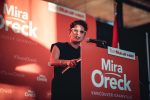In the last federal election, Mira Oreck was the NDP candidate for the riding of Vancouver Granville. (photo from Mira Oreck)
Nearly one year after the Canadian federal election, I had a chance to sit down with Mira Oreck (by phone), the NDP candidate for the riding of Vancouver Granville. I had knocked on doors with Mira during the early days of the campaign while I was visiting Vancouver that summer and I was eager to hear her reflections, particularly from a Jewish community standpoint.
Mira’s Jewish community affiliations run deep. She attended Beth Israel Hebrew School and Camp Ramah, she was president of her United Synagogue Youth region and served on the USY international board. She later went on to serve as regional director of Canadian Jewish Congress. Today, she is a member of Or Shalom Synagogue. Mira recalled being “overwhelmed” by how “members of the Jewish community connected with the campaign. People were genuinely curious and excited by the idea that someone from our community could be in Parliament.”
Unlike many other Canadian ridings, Mira said, the riding of Vancouver Granville was “primed for the conversation” around Jewish and Israel issues. And, since she already knew many Jewish community members and leaders personally, she said didn’t need to make cold calls to introduce herself. So, she was intrigued by a snippet of advice she heard someone give to one of her opponents who would indeed be making those rounds. The advice? The candidate should never mention the word “peace.” Apparently, to more conservative Jewish ears, “peace” is code word for being anti-Israel.
It’s a fascinating tidbit to me, since my reference point in academic circles is the reverse: many on the “far left” of the Israel-Palestine debate understand peace to be problematically “pro-Israel,” which is to say representing a complacent adherence to the status quo, without the hard work needed to challenge injustice. Whatever the correct referent is, this suggests how loaded is the discourse around Israel. It’s hard for candidates to speak their mind, knowing that every phrase could be a landmine.
But, on Israel, Mira insisted she kept her message consistent: against BDS, pro two-state solution. Her goal, as she put it to voters, was to “see peace in my lifetime … and not try to perpetuate ingrained ideas of the ‘other.’”
As much as she didn’t shy away from using the term “Zionist” to describe herself – despite some on her campaign preferring she not – Mira tried to emphasize that single-issue voting (for example, on Israel) has its limits. “I would say to voters that we are having an election in Canada and, first and foremost, my role as MP is to be concerned with the country we are governing.” For that matter, Mira said there were not “distinguishable differences on party platforms regarding Israel and Palestine. I wanted to know from [voters] what they thought the significant differences were; often people couldn’t name any.” Still, the topic of Israel came up “a lot less” than she expected. Instead, people in the Jewish community, she said, talked “about Bill C-51, refugees, climate change, child care … overwhelmingly more than I heard them talk about Israel.” The campaign, she said, “was a really good reminder” that “our community is not at all homogeneous.”
Sometimes, aspects of how politics played out as she engaged with members of the community saddened her. She recalled talking to a group of Jewish seniors, some of whom had been her Hebrew school teachers. They were Conservative party backers. “There was no amount of knowing me, coming from the Beth Israel synagogue and my connections to Israel, that enabled them to give me a fair hearing.” It was hard, she said. “I felt like they weren’t willing to know me for who I was, or the values that I hold.”
And there were times in the campaign where Mira had conversations that alarmed her but left her feeling hopeful. When she met with students at King David High School, she was shocked by some inflammatory descriptions of Palestinians. These students said things “that didn’t make sense, but were clearly coming from a very fear-based place,” she said.
Mira stood her ground. “I was really tough with the kids; really challenging them. I wasn’t trying to win over their votes; I was trying to have a real conversation with them about issues.” Later that afternoon, Mira recounted, two kids showed up to volunteer on her campaign. “It was a reminder,” she said, “that, while there were a few loud kids with strong opinions, others were thinking critically.”
Currently on maternity leave from being director of public engagement at the Broadbent Institute, a non-partisan think tank that describes itself as “championing progressive change through the promotion of democracy, equality and sustainability,” Mira – to me – represents the best our community has to offer when it comes to the sort of critical thinking she describes, and trying to make a difference, even if the nature of the electoral game means that one doesn’t always come out on top.
Mira Sucharov is an associate professor of political science at Carleton University. She is a columnist for Canadian Jewish News and contributes to Haaretz and the Jewish Daily Forward, among other publications.

